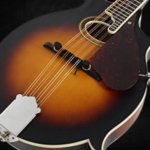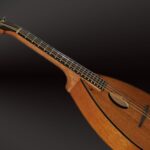In this post, I will share my pick for the best acoustic guitars for jazz after extensive research and hands-on testing.
Quick Answer: Best Acoustic Guitars for Jazz
- 1. Best Acoustic Guitar for Jazz Overall: Taylor 214CE
- 2. Best Beginner Acoustic Guitar for Jazz: Godin 5th Avenue
- 3. Best Intermediate Acoustic Guitar for Jazz: Gitane Dg-300
- 4. Best Professional Acoustic Guitar for Jazz: Seagull Performer
- 5. Best Cheap Acoustic Guitar for Jazz: Martin J-40
- 6. Best Acoustic Guitar for Jazz Under $1,000: Guild Jumbo Jr.
- 7. Best Dreadnought Acoustic Guitar for Jazz: Gibson Hummingbird
- 8. Best Cutaway Acoustic Guitar for Jazz: Blueridge BR-143CE
- 9. Best Acoustic/Electric Acoustic Guitar for Jazz: Martin D-45
- 10. Best Jumbo Acoustic Guitar for Jazz: Takamine GJ72CE
Jazz requires a different type of guitar than you’d typically use for rock or folk. Although a big hollow-body electric guitar might be the first thing that comes to mind when you think of jazz, acoustic guitars are also commonly used for this musical style.
The best acoustic guitars for jazz may work for other styles of music, but they’ll also have specific properties that make them suitable for jazz. This guide will help you pick out a decent acoustic guitar for playing this type of music.
I’ve been playing both electric and acoustic guitars for many years. I must admit that I feel most at home playing rock, but as a music teacher, I’ve had many students who were more inclined to playing jazz, preferring seventh chords over power chords.
I feel that the guitars listed in this post are excellent choices for playing jazz guitar and other musical styles. There’s something here for everyone.
Note: This list of the best acoustic guitars for 2022 has been edited and updated in 2022 to include new guitars and info that came out this year.
Acoustic Guitars By Music Type
Acoustic Guitars By Music Type
About the Best Acoustic Guitars for Jazz
To play jazz guitar on an acoustic, you’ll want an instrument that feels comfortable and is easy to play. Although many jazz guitarists do play standing up, it might feel more natural for you to sit, especially considering that the drummer and pianist are also sitting.
An acoustic guitar for jazz should fit over your knee and feel evenly balanced whether you sit in a chair or up on a high stool. Also, the guitar should sound great with higher gauge strings. These thicker strings bring out the tone of jazz chords.
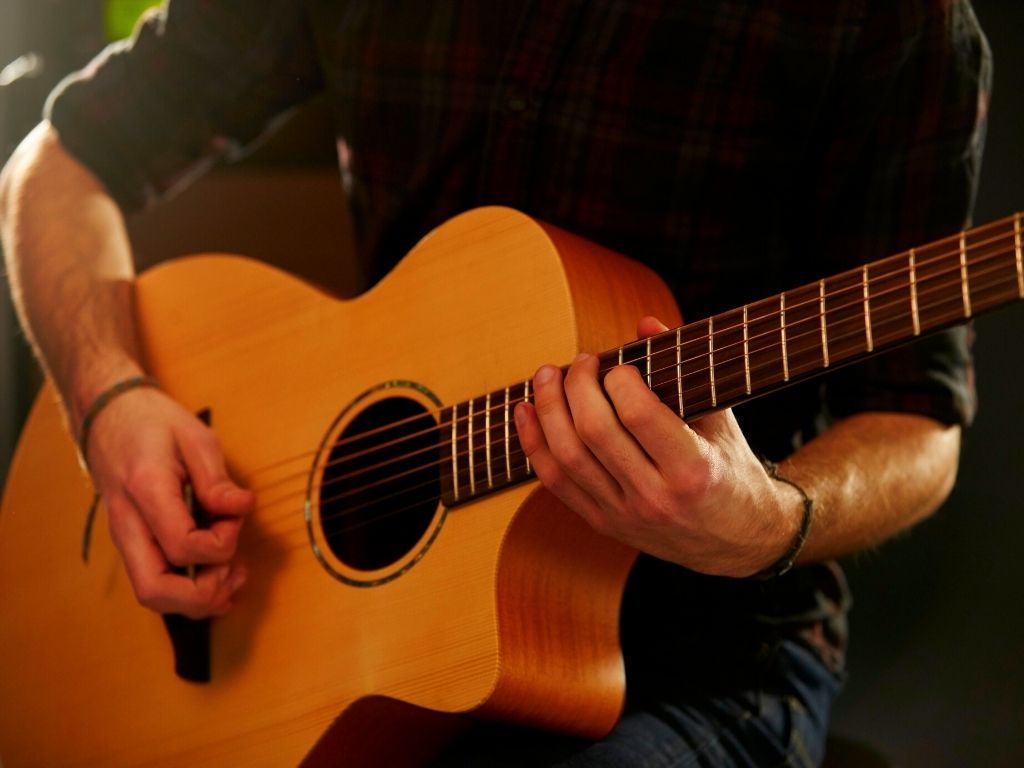
An acoustic guitar with a larger body, such as a full-size dreadnought or a jumbo guitar, is recommended because they have more tone and volume. Don’t be afraid to experiment a little bit with instruments if you want to play jazz.
About Jazz Music
Jazz music originated in the early 20th century. It has its roots in blues music and ragtime. Jazz music is more complicated when compared to other forms of music, as a lot of the chord forms are altered. Seventh chords are commonly used, and you’ll find that further alterations have you using your fingers in new and unexpected ways.
Jazz is an acquired taste for some people, and it’s a style not all musicians understand. Many jazz musicians have described the music as more of a language, with syntax and vocabulary.
Jazz guitar has a long tradition, and the guitar fits nicely between melody instruments and harmony instruments. You can play leads on it, like on a trumpet or a saxophone, and can also play chords on it, like on a piano. Many jazz musicians also perform solo, playing combinations of chords and single-note lines.
Famous and innovative jazz guitarists include Wes Montgomery, Grant Green, Jim Hall, Larry Carlton, Sonny Sharrock, John McLaughlin, John Scofield, Pat Metheny, Joe Pass, Charlie Christian, and Django Reinhardt.
Types of Acoustic Guitars for Jazz
During my time working at a music shop, I tried out many different types of acoustic guitars that you can use for jazz music. Next time you hit up a jazz club, check out the guitar being played. If it’s an acoustic, try to identify one of the main types listed below.
Dreadnought Acoustic Guitar
A dreadnought acoustic guitar is suitable for jazz, but it might not be the best option for some. This is because it lacks the cutaway, which gives you access to the higher frets. Without this, some complex jazz chords located higher up in the neck will be harder to fret, and you’ll be limited in how high you can go in your solos.
See Also: Martin D-28 Standard Dreadnought Acoustic Guitar Review
Cutaway Acoustic Guitar
A cutaway acoustic guitar is a great option for playing jazz. They give you free access up and down the neck to play chords and solos wherever you want. Many of these instruments also have pickups, so you can plug in and play whenever you want.
Acoustic-Electric Guitar
An acoustic-electric guitar is also another option for playing jazz, and probably the most common type of acoustic guitar used for jazz. These instruments have one or more pickups already installed. The body of these guitars are also typically cutaways, like most electric guitars.
Nylon String Acoustic Guitar
While you can use a nylon string acoustic for playing jazz, it may not the best guitar for this type of music. Nylon strings are quieter than steel, and you might not hear the guitar over all the other instruments.
However, if you’ll be playing fingerstyle jazz as a solo artist, a nylon string guitar is a great choice because it’s easy on the fingers and produces a nice resonance.
Jumbo Acoustic Guitar
A jumbo acoustic guitar is another option for playing jazz music. These instruments are larger than normal acoustic guitars, so they have great resonance and sound. The ability to play loud ringing chords and cutting solos make these instruments excellent for playing jazz in a Django Reinhardt-style Gypsy jazz combo.
Top 10 Best Acoustic Guitars for Jazz
Here’s my selection of the best acoustic guitars for jazz, based on my experience working in a guitar shop, teaching guitar to students, and seeing many different types of groups in jazz clubs. All of these instruments would be great selections to help you play this type of music.
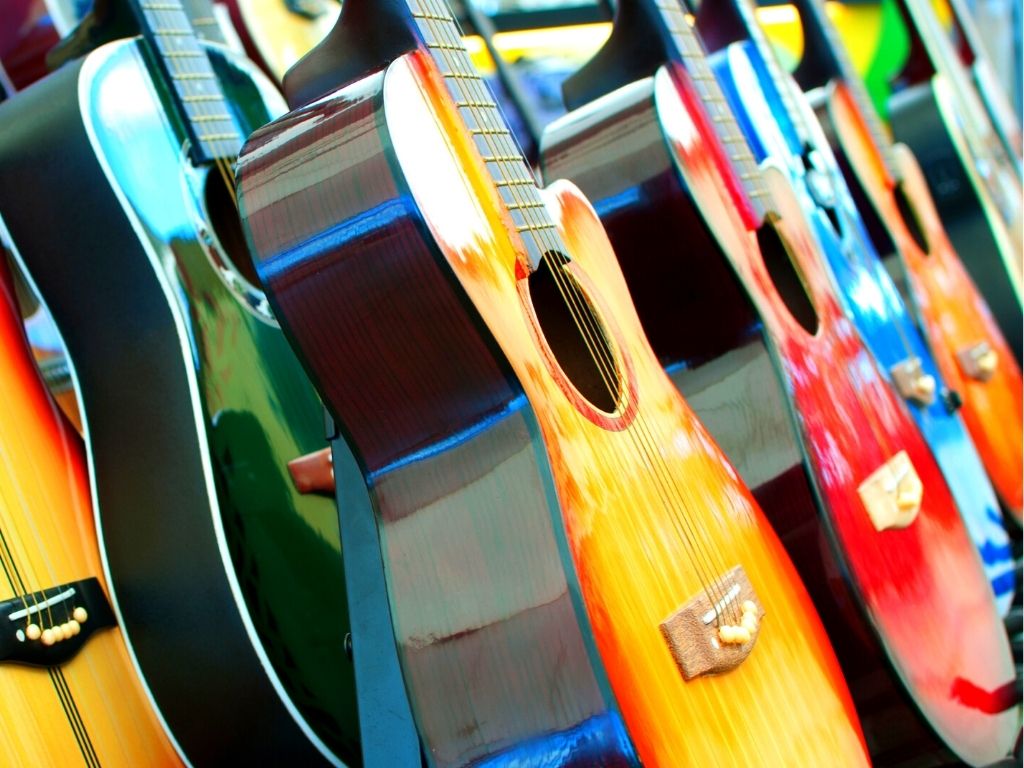
I’ve included instruments that will appeal to everyone who wants to play jazz. Some of these guitars I tried out myself in the guitar shop, some I taught a student their first seventh chords on, and some I spotted on stage over the bobbing heads of a smoky jazz club audience.
 1. Taylor 214CE Grand Auditorium Plus
1. Taylor 214CE Grand Auditorium Plus
- Scale length: 25.5″
- Fingerboard radius: 15″
- Frets: 20
- Pickup type: ES2 electronics
- Body shape: Dreadnought cutaway
- Included in the box: Guitar, gig bag
- Material & finish: Mahogany, rosewood, spruce, gloss finish
- Best for: Professionals that want a high-quality guitar
The Taylor 214 CE Grand Auditorium is a natural choice for playing jazz, or any other music style for that matter. The cutaway means you can construct your lead lines and build chords into the upper registers, and the built-in pickup with easy access controls near the neck make it suitable for playing in a jazz combo.
✅ Great tone
✅ Easy playing
✅ Gig bag
✅ Good electronics
❌ Expensive
❌ Could use a couple more frets
Why I Recommend It
In the guitar shop, I made a special point to always pull a Taylor off the rack. Taylor makes excellent guitars, and the 214CE Grand Auditorium Plus is one of their best professional acoustic guitars for jazz.
I really like the feel and balance of this guitar. It seems to fit your hands and body whether you’re standing up or sitting down.
Jazzy seventh chords ring out beautifully on this guitar, as well as sliding octaves, played like Wes Montgomery would. Just for fun, I crunched out a few power chords on the guitar, and it was like the guitar shop magically transformed from a jazz club to a metal concert (an acoustic one, of course). This guitar plays many musical styles exceptionally well.
 2. Godin 5th Avenue Kingpin
2. Godin 5th Avenue Kingpin
- Scale length: 24.84″
- Fingerboard radius: 16″
- Frets: 21
- Pickup type: P90
- Body shape: Dreadnought
- Included in the box: Guitar
- Material & finish: Mahogany, rosewood, spruce, gloss finish
- Best for: Intermediate and advanced jazz players
The Godin 5th Avenue Kingpin is the right choice for jazz guitar. It has the sound of both an electric guitar and an acoustic guitar thanks to the F-holes and P-90 pickup. It has classic, violin-inspired looks that will instantly make you feel like you belong in a shadowy ’50s jazz club in Manhattan swinging along with the greats.
✅ Great P90 pickup
✅ Smooth neck
✅ Big tone
✅ Solid bridge
❌ No case
❌ A bit hard to play
Why I Recommend It
If you’re looking for an excellent guitar to play jazz, the Godin 5th Avenue Kingpin is ideal. Your chords will ring out nice and clean with the P90 pickup. It has great projection thanks to the F-holes and solid wood construction.
I love the way the guitar sounds, and it has the looks to match. Besides this, I also like that it’s more lightweight when compared to some other archtops. The downside is the lack of a cutaway for easier fret access. Because of it, this is more of a guitar for comping than soling.
 3. Gitane DG-300 Gypsy Jazz Guitar John Jorgenson
3. Gitane DG-300 Gypsy Jazz Guitar John Jorgenson
- Scale length: 26.6″
- Fingerboard radius: 15″
- Frets: 22
- Pickup type: N/A
- Body shape: Dreadnought cutaway
- Included in the box: Guitar
- Material & finish: Spruce, mahogany, rosewood, gloss finish
- Best for: Gypsy jazz players
If you want to fulfill your Django Reinhardt dreams and play Gypsy jazz guitar, pick up the Gitane DG- 300. With the tone and looks to match, it’s an exceptional high-quality instrument for playing that type of music. It has a cutaway so you can access the higher frets, and it’s made with solid wood.
✅Great look
✅ Solid construction
✅ Good tone
✅ Excellent bridge
❌ Expensive
❌ Not suitable for some styles
Why I Recommend It
While obviously not as famous as Django, John Jorgenson is the highly respected and insanely talented leader of the John Jorgenson Quintet. He’s a celebrated luminary in the American Gypsy Jazz movement, and the first time I held this guitar, I must admit that I felt honored to be part of the tradition in some small way.
This is his signature guitar, the Gitane DG-300, and it lives up to its name with everything that you need to play the style. I like the bridge and the tailpiece on this model, which help keep the tuning stable and add to the look of the guitar.
 4. Seagull Performer
4. Seagull Performer
- Scale length: 25.5″
- Fingerboard radius: 16″
- Frets: 21
- Pickup type: Godin electronics
- Body shape: Dreadnought cutaway
- Included in the box: Guitar, gig bag
- Material & finish: Cedar, maple, rosewood, gloss finish
- Best for: Beginner/intermediate players
You can whip up some nasty jazz solos on the Seagull Coastline S6, which is an excellent guitar for many styles of music. It features a solid wood construction and has an excellent electronic system. The deep cutaway makes it easy to do on an acoustic what you’d normally do on an electric, hitting all those high notes.
✅ Good electronics
✅ Smooth neck
✅ Excellent tone
✅ Compensated saddle
❌ A bit expensive
❌ EQ a bit confusing
Why I Recommend It
I own a Seagull guitar similar to this one, and I’ve recommended the company to countless students and customers in the guitar shop. They make high-quality acoustic guitars that are great for all styles of music, including jazz.
I love the compensated saddle on this instrument, which improves its intonation. The guitar’s simple yet elegant design would look right at home on a jazz club stage being played between a grand piano and an upright bass.
 5. Martin J-40 Jumbo Acoustic
5. Martin J-40 Jumbo Acoustic
- Scale length: 25.4″
- Fingerboard radius: 16″
- Frets: 20
- Pickup type: N/A
- Body shape: Jumbo dreadnought
- Included in the box: Guitar, hardshell case
- Material & finish: Rosewood, mahogany, ebony, sitka spruce, gloss finish
- Best for: Jazz players that want a loud-sounding acoustic guitar
Whether in a jazz club or around a campfire, if you’re looking for a loud guitar for jazz music, the Martin J40 Jumbo is the instrument for you. This instrument features a solid wood construction, a sturdy neck, and high quality hardware.
✅ Huge tone
✅ Nice low neck profile
✅ Scalloped bracing
✅ Great looks
❌ Expensive
❌ No pickup
Why I Recommend It
You’re going to pay a lot for the Martin J 40 Jumbo, but it’s an excellent jazz guitar. The large jumbo size means that it has an excellent projection for jazz chords and solos. You’ll get a full tone out of this guitar no matter what you’re playing.
It has a low-profile neck, so it’s easy to play on. I never struggled with chords or playing solos on this instrument. I’ve seen this guitar again and again, in the hands of jazz, rock, and folk players, and the sound is right for all of those musical styles.
 6. Guild Jumbo Junior
6. Guild Jumbo Junior
- Scale length: 23.75″
- Fingerboard radius: 12″
- Frets: 19
- Pickup type: Fishman
- Body shape: Dreadnought jumbo
- Included in the box: Guitar
- Material & finish: Spruce, mahogany, merando
- Best for: Beginner players looking for a reliable guitar
Because of its smaller size, the Guild Jumbo Junior is an excellent choice for younger students who want to play jazz guitar. Similar to the Martin, it’s a workhorse guitar made of solid wood, so it has a powerful, cutting tone. It also comes with a pickup, so it’s ready for an amplifier.
✅ Smaller body size
✅ Easy to play
✅ Pickup
✅ Solid construction
❌ It may be too small for some
❌ Tone lacks a bit of definition
Why I Recommend It
Guitars of this size aren’t only for students. I like this guitar because it’s also good for travel. It will fit easily in the overhead compartment of an airplane or bus, and it won’t be a nuisance as you carry it over your shoulder while pulling a larger bag.
I love the solid spruce top, which improves this instrument’s overall tone. It has solid machine heads, so it’s going to stay in tune. The price is right too. This is one of the best cheap acoustic guitars for jazz, whatever your age.
7. Gibson Hummingbird
- Scale length: 24.75″
- Fingerboard radius: 16″
- Frets: 20
- Pickup type: Fishman
- Body shape: Dreadnought
- Included in the Box: Guitar
- Material & finish: Mahogany, rosewood, nitrocellulose lacquer
- Best for: Professionals looking for a top tier guitar
Along with Martin, Gibson is a top name when it comes to guitars for all kinds of styles. The Gibson Hummingbird has what you want for acoustic jazz, including a built-in pickup, so it’s ready for any amplifier. You get the high-quality Gibson tone and attention to detail when you purchase this instrument.
✅ Pickup
✅ Amazing tone
✅ Great look
✅ Solid machine heads
❌ Expensive
❌ Could use a couple more frets
Why I Recommend It
A jazz-loving guitarist friend of mine owns the Gibson Hummingbird, and I had a great time playing it when we traded guitars (and licks) one night at a jam session. Seventh chords ring out loud and strong on this guitar, and playing lead lines is a breeze, thanks to the well-crafted and comfortable neck.
It has an exceptional tone, so both chords and lead guitar lines sound great on this instrument. This model also comes with a Fishman pickup and it sounds wonderful through an amp. I had a great time playing this guitar, and I look forward to the next time I can get my hands on it.
 8. Blueridge BR-143CE
8. Blueridge BR-143CE
- Scale length: 25.6″
- Fingerboard radius: 12″
- Frets: 21
- Pickup type: Fishman
- Body shape: Dreadnought cutaway
- Included in the box: Guitar, gig bag
- Material & finish: Mahogany, spruce, rosewood, gloss finish
- Best for: Intermediate or advanced guitar players
The Blueridge BR-143CE has a nice slim body, so it’s comfortable to hold when you’re playing complex jazz chords. The great pickup system and cutaway means it can handle all kinds of jazz situations, such as playing in large swing groups, mellow combos, or an intricate solo performance.
✅ Pickup system
✅ Slim body
✅ Easy to play
✅ Great tone
❌ Expensive
❌ Complex EQ
Why I Recommend It
I love the Blueridge BR-143CE, and I consider it a great guitar for all styles of music. If you were so inclined, you could switch from jazz standards to folky strumming to rock riffs all in the same jam with this guitar.
This model has a tuner and a full equalizer system built into it, so it’s perfect for the studio or stage. The solid mahogany back and sides improve the tone of the instrument. This model also comes with a deluxe gig bag.
 9. Martin D-45
9. Martin D-45
- Scale length: 25.39″
- Fingerboard radius: 16″
- Frets: 20
- Pickup type: N/A
- Body shape: Dreadnought
- Included in the box: Guitar, case
- Material & finish: Rosewood, ebony, spruce, gloss finish
- Best for: Professional guitar players
Once again, Martin makes the list, which makes sense considering they are one of the premier guitar manufacturers. If you don’t mind paying a little extra for an exceptional acoustic guitar for jazz, the Martin D-45 is an excellent choice.
This guitar has a long history, and it’s the flagship guitar of the Standard Series. It has lovely pearl inlays and a classic dreadnought style.
✅ Superior tone
✅ Great neck
✅ Abalone fret markers
✅ Solid wood
❌ Expensive
❌ No pickup
Why I Recommend It
They may not be jazz musicians, but if this guitar is good enough for Gene Autry and Neil Young, then it’s good enough for me. It’s one of the best acoustic guitars I’ve ever had my hands on, which is saying a lot.
You’re not going to get much better than a Martin D-45 for jazz guitar or other forms of music. These instruments cost a lot, but you get the reliability that you want out of the guitar.
The neck has a high-performance taper, which gives you more speed up and down the fretboard. The instrument has solid machine heads and excellent hardware in general. It’s ready for any musical style, including jazz.
 10. Takamine GJ72CE
10. Takamine GJ72CE
- Scale length: 25.4″
- Fingerboard radius: 12″
- Frets: 21
- Pickup type: Takamine
- Body shape: Jumbo cutaway
- Included in the box: Guitar
- Material & finish: Rosewood, mahogany, spruce, maple, gloss finish
- Best for: Intermediate players that need a high-quality guitar
The Takamine GJ72CE is a loud, boisterous guitar that’s well suited for jazz, especially Gypsy jazz. The jumbo cutaway gives access the higher frets, and the large body provides a great deal of projection and sustain. It comes with a pickup system, so it’s ready to plug into any amplifier.
✅ EQ and pickup
✅ Great tone
✅ Cutaway
✅ Good price
❌ No case
❌ EQ a bit confusing
Why I Recommend It
This Takamine guitar is an excellent choice for any intermediate player. It’s not as expensive as the Martin, but it has the power and feel that intermediate guitarists will want as they advance on the guitar, whether they’re playing jazz, rock, or any other style of music.
I love the bulky yet elegant shape of this guitar. It would look right at home on a coffeeshop stage or in a basement jam. I’d be just as comfortable bringing it to the beach as bringing it to a jazz club.
The built-in pickup and equalizer system includes bass, treble, and middle controls. The guitar also has a built-in tuner you can access through the equalizer. This guitar has everything that you’ll need for jazz.
Best Acoustic Guitars Brands for Jazz
Here are the best acoustic guitar brands for playing jazz. These manufacturers are recommended as they make the best guitars for playing this type of music.
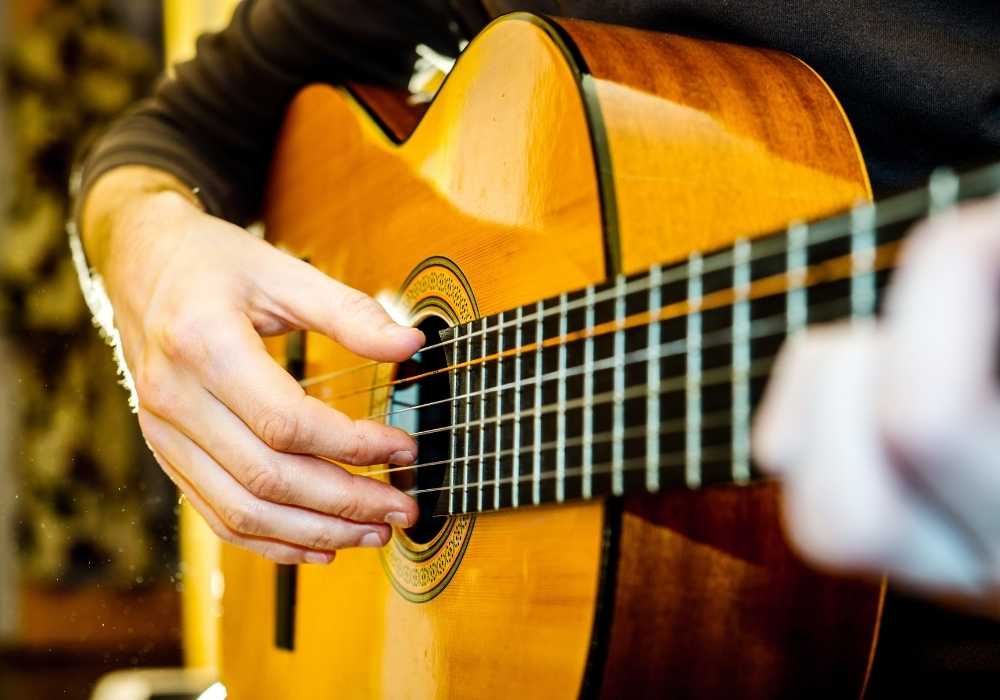
Go with a brand name if you want a high-quality instrument for playing jazz. I’ve tried out numerous guitars from all of these brands, and I can assure you that they are all dependable, tried-and-true companies.
Taylor
One of the better companies for high-quality acoustic guitars is Taylor. They have instruments in all price ranges. Many of their guitars feature pickups and deep cutaways, so they’re easy to solo on.
Martin
Martin is perhaps the best company to purchase an acoustic guitar from. Many of their models are well known in the industry and have been used by countless musicians on famous records.
Guild
Another solid company that sells acoustic guitars is Guild. They have a wide range of different models for you to choose from. These acoustic guitars are suitable for all styles of music.
Gibson
While Gibson is best known for their electric guitars, they also make high-quality acoustic guitars. Many of their instruments are well suited to jazz as well as other styles.
Seagull
I’m a fan of Seagull Guitars, which is a company based in Canada. I have one of their models and find that it has an exceptional tone. They have a wide range of guitars for all players.
Things to Consider When Choosing an Acoustic Guitar for Jazz
Here are a few things to keep in mind before buying an acoustic guitar for playing jazz music.
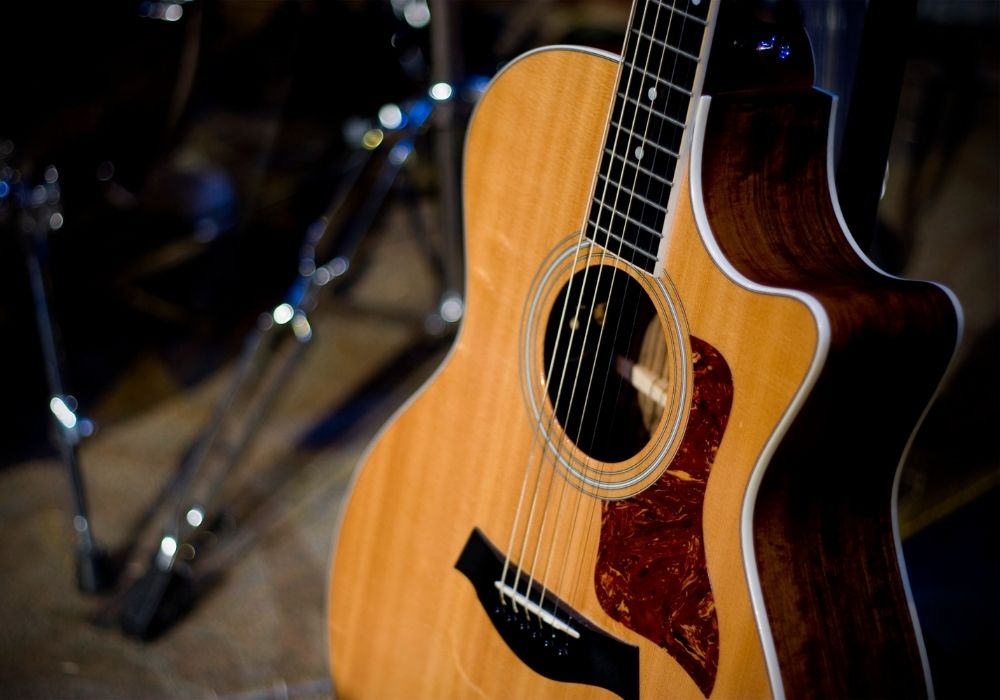
You want an instrument that’s going to meet your requirements both now and in the future.
Level of Experience
Your level of experience with the acoustic guitar will be a consideration in the type of instrument you purchase.
A beginner doesn’t need the full features that an advanced player probably wants, while most advanced players know exactly what they’re looking for. If you’re a beginner, it’s better to get a well-rounded (and inexpensive) guitar to learn on and then upgrade to a fancier guitar with more individual properties.
Beginner Acoustic Guitars for Jazz
A beginner guitar should be comfortable for you to hold and easy to play. A pickup isn’t always necessary, particularly if you don’t own an amp. The most important thing is comfort, playability, and affordability.
Intermediate Acoustic Guitars for Jazz
At the intermediate level, you’ll have more of an idea of what you’re looking for. You may be looking for an acoustic guitar with a pickup system, a cutaway, or other features in line with how you want to play.
Pro Acoustic Guitars for Jazz
When you’re at the professional level, you can pick and choose the options that you want for your acoustic guitar. You may end up spending quite a lot of money on your acoustic, especially if you’re going to do some recording. But consider it an investment. A good acoustic guitar for jazz will last a lifetime.
Size
A full-size dreadnought or jumbo size guitar is usually the best option if you want to play jazz. This is because this type of guitar has more projection, and the notes will ring out nice and clean.
Wood
There are different tonewoods that you can get for acoustic guitars. Expensive instruments made with better quality tonewood are your best option for the best sound possible. Here are some common tonewoods.
- Cedar: Some guitars feature a cedar top, which have a lot of resonance and a good tone.
- Spruce: This has similar tone to cedar. Sitka spruce is often the preferred choice.
- Mahogany: This is often found on the back and sides of acoustic guitars and gives a good tone.
- Maple: This wood is quite durable and is used to construct acoustic guitars.
- Rosewood: This is often used for the guitar fingerboard. Another common wood is ebony.
Finish
Acoustic guitars have various finishes. Here are the common ones that you should know about it.
- Lacquer: There are many different types of lacquer used on acoustic guitars. It provides a nice shine as well as a long-lasting finish.
- Nitrocellulose lacquer: This is probably the most common type of lacquer. It has a long life and an excellent shine that makes the instrument look great.
- Poly finish: This is a durable finish with a high gloss, and the most common type is polyurethane.
Color
Most acoustic guitars have a natural finish. However, you can get acoustic guitars in different colors, such as black and white, but these aren’t that common. Most prefer the natural color of the tonewood.
The Overall Tone & Sound
You want to have an acoustic guitar that has a decent tone and sound to it. This is usually a personal preference. What you like in an acoustic guitar, someone else might not. You have to experiment a bit until you find the tone you like.
Price
The price of your acoustic guitar should be important to you. Beginner players looking for their first guitar might not exactly what to look for, so they should probably head for a budget guitar. Here are a few things to keep in mind when purchasing your acoustic guitar.
Budget Acoustic Guitars for Jazz
A budget guitar for jazz will run somewhere between $300 to $500. You don’t want to go much lower than this because you won’t get the sound and volume you need for playing this style of music.
Midrange Acoustic Guitars for Jazz
A mid-range jazz guitar will run around $500 to $1,200. At this price, you can pick and choose the features that you want. A jumbo acoustic or a nice cutaway is always a great option.
Top-End Acoustic Guitars for Jazz
A top-end acoustic guitar is going to run anywhere from $1,200 to around $10,000. This is where you get the best of the best. This is what you’ll want if you’re a professional and you’ll be playing live or doing some serious recording.
Frequently Asked Questions:
Here are some frequently asked questions that people ask about acoustic guitars for jazz.
What Strings Should I Use?
If you’re going play jazz guitar, you should use light or medium gauge strings. This is so the notes ring out nice and clear when playing jazz chords or lead guitar lines. Strings smaller than light won’t give you the volume.
What Is the Best Choice?
The choice of guitar you pick for jazz will depend upon what you like to play. You need to try several models to determine the best instrument for your overall playing style and ability level.
One crucial decision is whether you want a cutaway or not. If you’ll be doing any soloing, you should probably go for a cutaway.
Do I Need a Pickup?
A second crucial decision is whether to get a guitar with a pickup or not. You don’t need a pickup on an acoustic guitar, especially if you’re just learning. But if you’re playing live or in a group, you most certainly want a pickup so you can be heard from the stage and over the other instruments.
You can get models with pickups installed or install one yourself if you want one later on.
What Are the Best Acoustic Guitars?
Here are three of the best acoustic guitars for playing jazz. These are only my personal selections. You might have ones that you like more.
Seagull Performer: Best for Beginners
The Seagull Performer is an excellent, well-rounded guitar for beginners and also for intermediate players. I love its looks and tone. It comes with a pickup system and a nice cutaway, two important features for a jazz guitar.
Godin 5th Avenue Kingpin: Best for Intermediate Players
The Godin 5th Avenue Kingpin is great because it’s both an acoustic and electric guitar. It has an excellent P90 pickup for great sound projection. It has the look and feel of a jazz guitar, and it will get you swinging in no time.
Martin D-45: Best for Professional Players
The Martin D-45 is an excellent guitar and suitable for many styles of music, including jazz. It has an exceptional tone, a great playing neck, and an excellent look. This guitar is a timeless classic that’s capable of almost anything.
Where Are the Best Acoustic Guitars for Jazz Made?
Most companies that manufacture high-quality acoustic instruments are located in the United States.
What Is the Best Sounding Acoustic Guitar for Jazz?
The overall best-sounding acoustic guitar for jazz is the Martin D-45. This is a high-quality guitar suitable for many styles of music. It has the superior tone that you need.
Where to Buy Acoustic Guitars For Jazz?
Here are a few recommended places where you can pick up acoustic guitars for jazz. In general, I like to buy online because there’s a wide selection, great customer service, and fast shipping.
Amazon
My preferred retailer online is Amazon. They have an amazing selection and good prices, and I like to read the reviews before ordering.
Online Music Retailers
Guitar Center and Sweetwater are two other excellent online retailers. They have a wide selection of instruments, reasonable prices, fast shipping, and excellent customer service.
Your Local Music Store
Your local music store is another place to pick up a good acoustic guitar. They might not have as wide of a selection, but you can get one-on-one personal service. Also, you can try out the guitar before you buy it.
Review This Post
Table of Contents
In Conclusion
This guide to the best acoustic guitars for jazz should help you find something suitable, whether you’re a beginner or an advanced player. All of these instruments would make excellent selections.
Please comment, like, and share this article. I look forward to hearing from you, and maybe someday, seeing you in a jazz club swinging away on one of these exceptional acoustic guitars for jazz.











